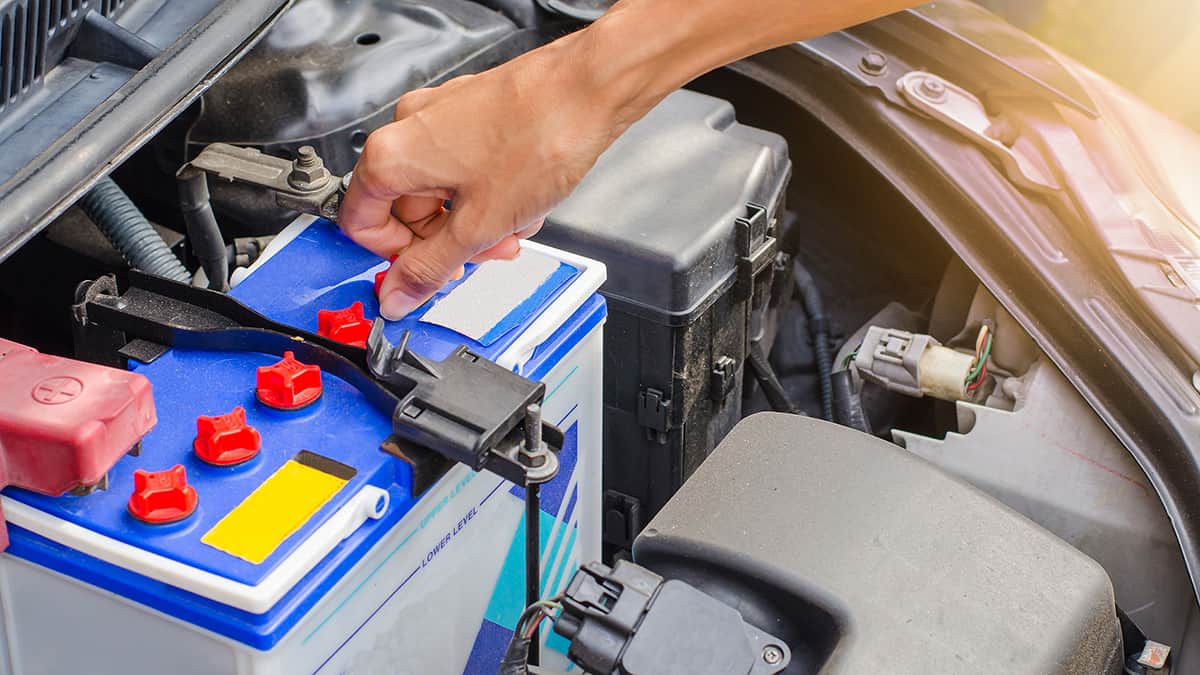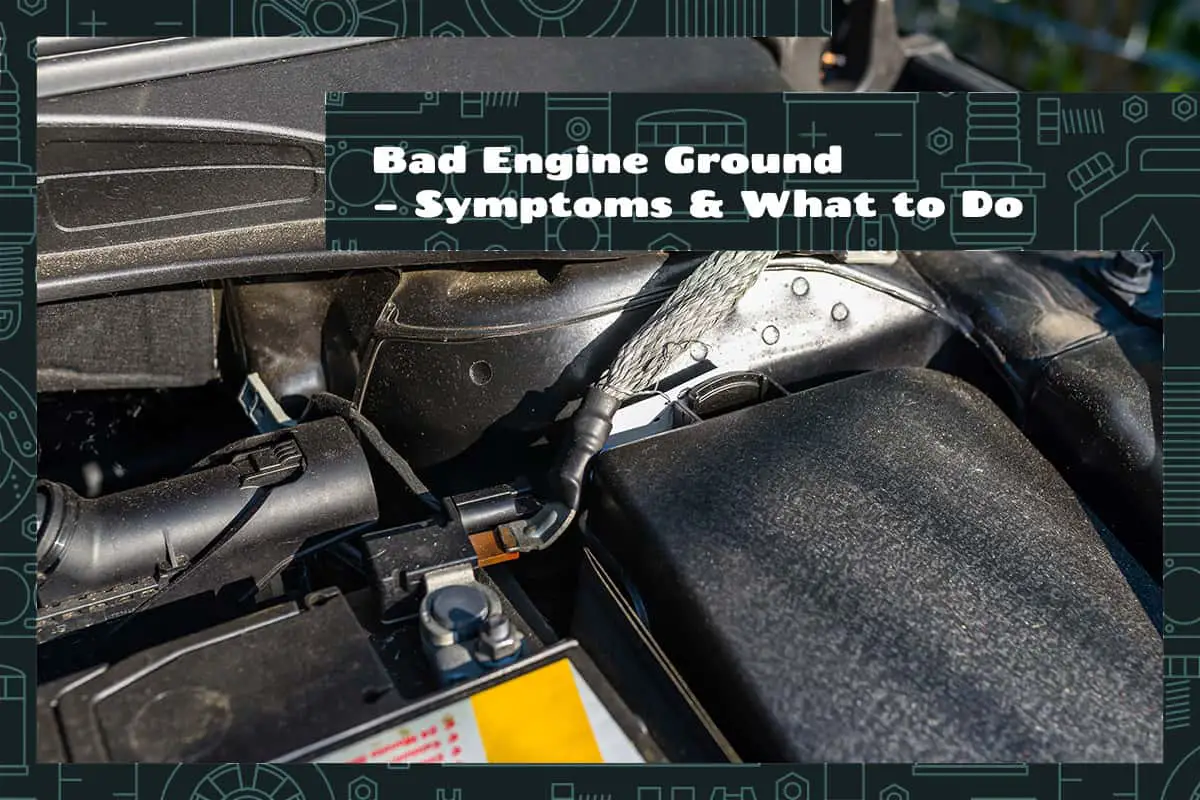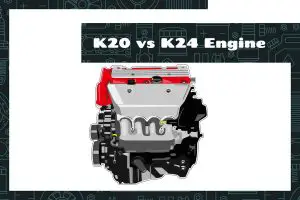The engine ground of a car provides a pathway for electricity to return safely after powering up your vehicle’s many gadgets. It’s a bit like a guardrail, ensuring all the electricity stays on track. But sometimes, this guardrail can get damaged or worn out, and you should do your best to figure out why.
Signs a bad engine ground include:
- Erratic engine behavior
- Dim or flickering headlights
- Slow crank or no crank
- Unusual noise from the starter
- Electrical issues
This article will provide a deep dive into the world of engine grounds. We’ll discuss the common symptoms of a bad engine ground and how to fix it.
Basics of Bad Engine Ground
To understand what a bad engine ground is, let’s start with what an engine ground, or grounding, is in the first place.
Engine ground is an electrical connection that acts like the earth beneath our feet. This grounding is usually a thick cable connected from your vehicle’s engine or frame to the negative (-) battery terminal. The battery sends out power (like you leaving your house), the power does its job in different parts of the car, and then it needs to come back home to the battery, which the engine ground helps with.
Causes of Bad Engine Ground
The grounding can also deteriorate. Some of the usual culprits that lead to a bad engine ground are:
- Corrosion: Moisture, dirt, and air can cause the metal parts of the engine ground to rust or corrode. This weakens the electrical connection, leading to grounding problems.
- Loose connections: The engine ground cable might become loose due to vibrations or inadequate installation.
- Wear and tear: Parts of the engine ground get worn out over time, especially the ground strap or cable. This can lead to a weak or bad ground connection.
- Damaged components: Sometimes, parts of the grounding system can get physically damaged, like from an accident or hitting a big bump. This can break or weaken the ground connection.
Symptoms of a Bad Engine Ground

Recognizing the symptoms of a bad engine ground is like being a detective. You’re looking for clues that something is not quite right. But instead of a magnifying glass, you’re using your eyes, ears, and sometimes even your sense of touch. Here are the most common symptoms to watch out for.
1. Erratic engine behavior
This might include a car that’s hard to start or an engine that suddenly stalls while driving. It’s as if your car has a mind of its own and doesn’t want to listen to you. This is because the electricity that should be smoothly flowing back to the battery gets disrupted.
2. Dim or flickering headlights
If your headlights are dimmer than usual or flicker on and off, it’s like your car is sending a distress signal. It means there’s not enough power reaching the headlights, which could be due to a bad engine ground.
3. Slow crank or no crank
The engine requires a lot of electrical power to start, and if the ground connection is weak, it might struggle to crank or not crank at all.
4. Unusual noise from the starter
If you hear a clicking or grinding sound when you try to start your car, it might be the starter motor struggling to get enough electricity. And the root cause could be a bad engine ground.
5. Electrical issues
Once the electrical flow is disturbed, it can affect many parts of your car. You might notice issues like the radio turning on and off, power windows operating slowly, or even the car alarm going off randomly.
Diagnosing a Bad Engine Ground
We can diagnose a bad engine ground by looking for certain signs in our vehicle. Let’s go through the steps you can take to identify a bad engine ground.
1. Observing symptoms
As we learned earlier, there are several signs, like flickering lights, weak starting or stalling, and inconsistent performance. These signs are clues that there might be an issue with your engine ground.
2. Visual inspection
The next step you can take is to visually inspect the engine ground wires and connections. You’re looking for things like corrosion, frayed wires, and loose connections.
3. Using a multimeter
A multimeter can measure electrical resistance. If the resistance is high, it means your engine ground is not conducting electricity well, and it may need to be fixed.
4. Seeking professional help
If you’re still unsure whether you have a bad engine ground or if you’re not comfortable doing these tests yourself, it might be a good idea to take your car to a professional. A mechanic has the skills and tools to accurately diagnose and fix the issue.
The Impact of a Bad Engine Ground on Vehicle Performance

A bad engine ground might seem like a small issue, but it can actually cause some big problems. Let’s understand how a bad engine ground can affect your vehicle’s performance.
1. Effect on the electrical system
As the ground is the return path for all the electricity flowing through your car, if that path is broken or weakened, it affects the entire electrical system. This means that everything from the headlights and radio to the engine and starter motor can suffer.
2. Impact on the vehicle’s ignition system
The ignition system of your car, which is responsible for starting the engine, is heavily reliant on electricity. With a bad engine ground, the ignition system might not get the electricity it needs, leading to difficulties starting the car or even a complete failure to start.
3. Influence on fuel efficiency
The engine’s sensors and control units, which help optimize fuel use, need electricity to function properly. If they’re not getting the right amount of power due to a bad ground, they can’t do their job properly, leading to increased fuel consumption.
4. Potential damage and repair costs
Electrical surges can damage sensitive components, and the strain on the engine can lead to mechanical issues. Plus, troubleshooting and fixing these issues can be time-consuming and costly.
How to Fix a Bad Engine Ground
Fixing a bad engine ground might seem like a humongous task, but with the right tools and some patience, it can be tackled just like a tricky math problem. Here are the steps you’ll need to take.
1. Identifying the grounding points
The first step in fixing a bad engine ground is knowing where to look. Your vehicle has several grounding points, and any one of them could be causing the issue. You’ll find these grounding points in the engine bay and the vehicle’s frame.
2. Inspecting the grounding points
Once you’ve found the grounding points, the next step is to inspect them. Look for signs of corrosion, loose connections, or physical damage. If the grounding wire is frayed or the grounding point is rusted, it’s a clear sign of a problem.
3. Cleaning the grounding points
If you find corrosion at the grounding points, they will need to be cleaned. You can use a wire brush and a corrosion removal solution to do this.
4. Tightening or replacing grounding connections
If the grounding cable is loose, it should be tightened. If it’s damaged or worn out, it may need to be replaced. This is like replacing a worn-out or loose belt. You want it to be secure and in good shape so it can do its job.
5. Testing the ground connection
After cleaning and securing the grounding points, you should test the ground connection. A multimeter can help you do this. If the resistance is too high, it means the ground connection is still not good. If it’s not up to the mark, you may need to seek professional help.
FAQs
1. Can a bad engine ground cause a vehicle to stall?
Yes, a bad engine ground can cause a vehicle to stall. The engine needs a steady supply of electricity to run smoothly, and a bad ground can interrupt this. If the engine’s electrical components aren’t getting the power they need, it can cause the engine to suddenly stop or “stall.”
2. How much does it cost to fix a bad engine ground?
The cost of fixing a bad engine ground can vary. If it’s a simple issue like a loose or corroded wire, you might be able to fix it yourself with just the cost of a few tools or replacement parts. This could be around $10 to $30.
But if the problem is more complex or you’re not comfortable doing it yourself, you might need to hire a professional. In that case, it could cost anywhere from $50 to $200, depending on the labor charges and the complexity of the job.
3. How often should the engine ground be checked?
Checking the engine ground should be part of your regular vehicle maintenance. It’s a good idea to check it at least once a year or whenever you’re experiencing electrical problems with your car. Your car may rarely experience this problem, but it’s still worth checking, especially while you’re following a maintenance checklist.






